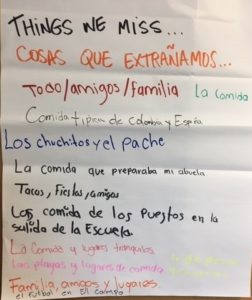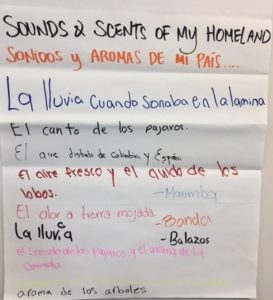
Julija (pronounced Yoo-lee-uh) Zubac is the Manager of Restorative Communities at the Partnership for Los Angeles Schools. She was born in Bosnia-Herzegovina and is a graduate of the University of Pennsylvania and Claremont Graduate University.
It was the summer of 1997, and you may remember it as the summer when Dr. Dre dropped the Next Episode and the Chicago Bulls ruled the NBA. That summer, I immigrated to the United States as a Bosnian refugee and enrolled in public high school, knowing fewer than five words in English. Dictionary in hand, I entered the American school system not knowing what to expect. Needless to say, it was a summer filled with tears. I remember crouching on the floor in our one-bedroom apartment crying to my parents about this new language that I could not decipher. Beyond the language, everything was new and different: the way the teachers taught, the chairs we sat in, the ubiquitous youth fashion, cops in school, the myriad of cultures all around me. Mostly, I was different, because my bright orange bag stuck out like a sore thumb among a sea of JanSport backpacks, as did my accent and mannerisms. It was through sheer hard work, and especially the support of my teachers and my family, that I made it to a four-year Ivy League college and later to graduate school. Today, as hundreds of young people escape violence and poverty from Central America and Mexico, how can we support their adaptation into a new country? Their stories often go unreported. At schools in the Partnership for Los Angeles Schools’ network, we are seeing hundreds of young people join our classroom communities with powerful stories of survival, resilience and determination.
- Image 1
- Image 2
Restorative justice, an approach to healing harm through the rebuilding of relationships, can help educators in supporting students and elevating student voice. At the Partnership, we build capacity among educators to implement restorative justice practices both as a conflict resolution strategy and as an overarching vision and tool for relationship building across the school community. Recently at Mendez High School in Boyle Heights, we gathered in circle with a group of English Language Learners to share stories about our migration journeys. Mr. Contreras, English teacher and Restorative Communities Lead, and I shared our own stories, then asked students to chart what they missed about their homeland, things they do not miss, and who or what they are grateful for. Students’ young, joyful faces turned expressive as they wrote such statements as, “I don’t miss the dead bodies that appeared in the streets or in the fields,” and “I don’t miss bad influences, the crime, and the corruption.” Yet, there was beauty amidst the heartache. Many shared beautiful scenes of their homelands that stand in sharp contrast with the violent images we see in the media. They miss specific sounds and scents from their homeland. Some said, ”I miss the food,” “Playing soccer or fútbol in the fields,” and “my friends and family” (see image 1). Others stated missing the rain, the birds, the fresh air, the trees, the smell of wet earth and the banda music (see image 2). Storytelling activities such as this are a powerful way to engage youth and validate students’ lived experiences.
Through our restorative work across our network of schools, we are able to provide support to students by connecting educators across schools and sharing best practices. In response to the need to support, Mendez High School students started a club for newcomers, called Las Razas Unidas. This club is supported by English teacher Ms. Stemnock, and Restorative Justice Coordinator, Ms. Emily Grijalva, who also advise the club. “I felt they needed a place at Mendez. As diaspora people (with ties to multiple homelands), they benefit from making connections,” Ms. Stemnock explains. “Collectively we formed a support network for these kiddos and this year we launched a one-day workshop to help start the school year off positively for us and them.” Similarly, in South Los Angeles at Santee Education Complex, where over 100 recent immigrants are enrolled, staff members are planning support circles to convene their international students and offer a consistent support system. Principal Susana Ansley-Gutierrez prefers to call them international students rather than newcomers, because she believes that language is important and reveals our underlying perceptions. In college, international students enjoy a positive reputation, as they are seen as well-rounded, sophisticated individuals. Principal Gutierrez wants students at Santee to feel the same: that they are valued, cared for and integral to the school community. A great message and reminder for us all. In the words of former president, Franklin D. Roosevelt, “[…] remember, remember always that all of us, and you and I especially, are descendants from immigrants and revolutionists.”


